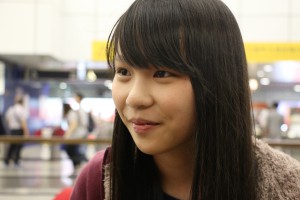However, Shek’s boyfriend, 22-year-old Chan Man-wai, who has participated in different protests and social movements, has a slightly different take. He acknowledges that division of labour along gender lines is commonly seen in social movements but he believes men are usually assigned to the frontline while women are assigned to do more back-up work for the sake of efficiency.

He also thinks asking women to retreat from the frontline is a practical consideration rather than a gender issue.
“In the Occupy Movement, I saw a girl standing in the frontline but she had very little equipment to protect herself. I was worried about her safety and asked her to step behind for a while,” says Chan.
Reports of sexual assault and harassment from anti-Occupy groups were reported during the occupation of Mong Kok, and quips such as, “If you come out to protest, you should expect to be groped!” were widely heard. Chan says that in such circumstances he sometimes felt a need to protect female protesters. Sometimes he would put himself between female protesters and policemen. However, he agrees that women should also be able to take more radical action and adds that he did not ask anyone to leave Mong Kok at the time.
As for criticisms and insults based on female protesters’ bodies and appearance, Chan notes it exists on both sides of the political divide. For instance, the convener of the pro-government Justice Alliance, Leticia Lee See-yin is frequently the target of sexual insults online. For some who disagree with her views, attacking her looks seems to be fair game.
Chan counts many of his friends among those who insult Lee in this way but he disapproves of such behaviour.
“I do not know whether criticising her for being fat and ugly is a way to express disagreement towards her political stance or if it is the truth. But for me, these criticisms are not right,” says Chan.

Not all women in the public eye see criticism of females in the public and political spheres as being gender-based attacks. Agnes Chow Ting, former spokesperson of student activist group Scholarism, says: “It is not a sexual attack because if I were a boy, the only difference would be the words that they use…it is all about political stance. They don’t have the same political stance as you, and they simply want to insult you.”
Chow’s public nicknames, such as “BB” and “goddess” are flattering compared to those for some other women in politics. But she questions whether these labels should be used at all, whether for men or women in the public sphere.
For Civic Party Vice-chairman Tanya Chan Suk-chong, such labels go with the territory because politics is all about perception. “It’s not just women, people also focus on the appearance and image of men, label them as ‘gods’,” says Chan.

Chan, one of two women who symbolically shaved their heads in support of the Occupy Movement last year, believes it is normal for people to discuss female politicians’ appearance and the media find it an easy target. But she thinks once a female politician has political achievements under her belt, the discussion about her looks will stop.
“People can only talk about your body, make-up, hairstyle and marriage if you have nothing else to be discussed. But when you have some achievements, people will talk about something else,” says Chan.






































